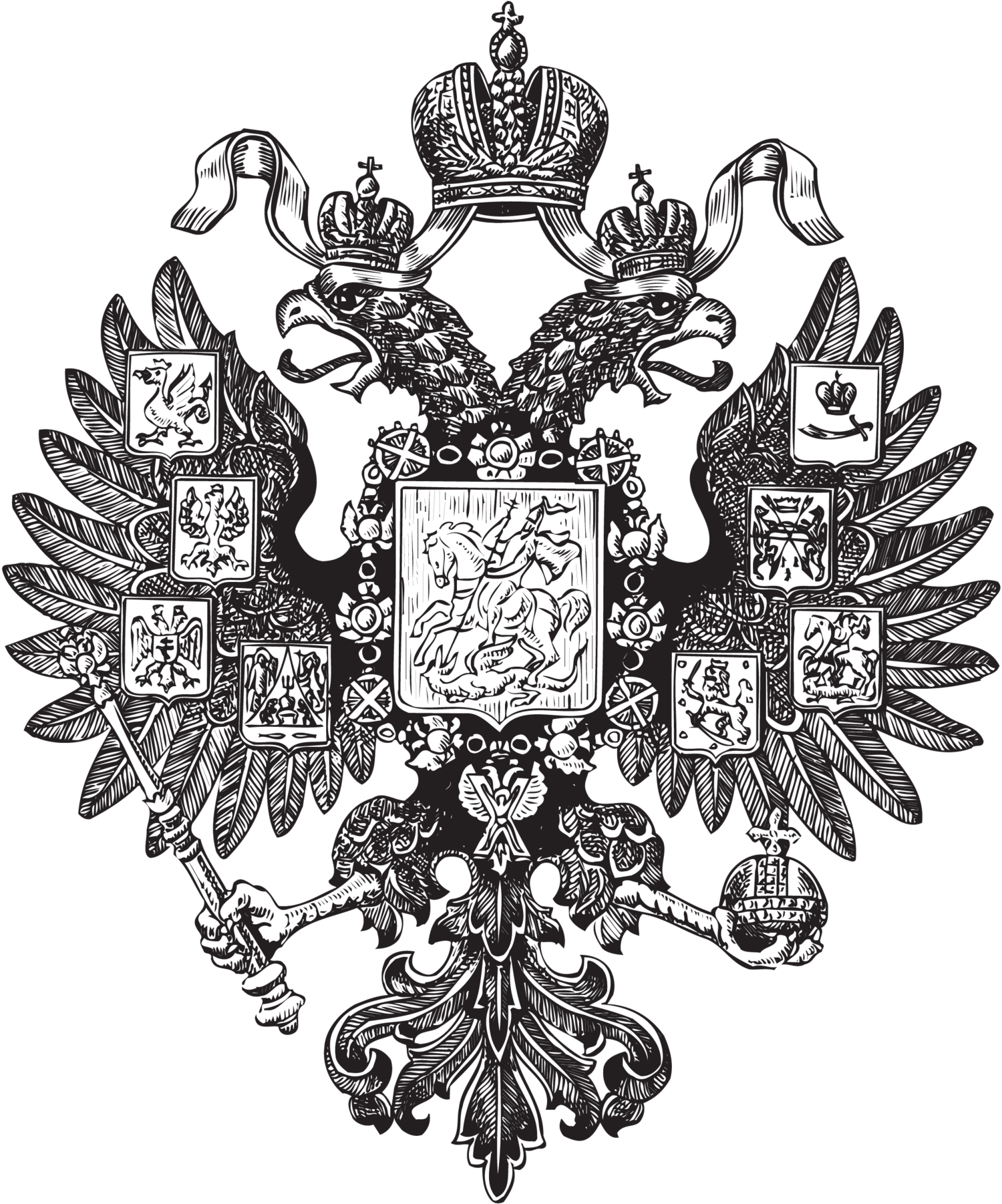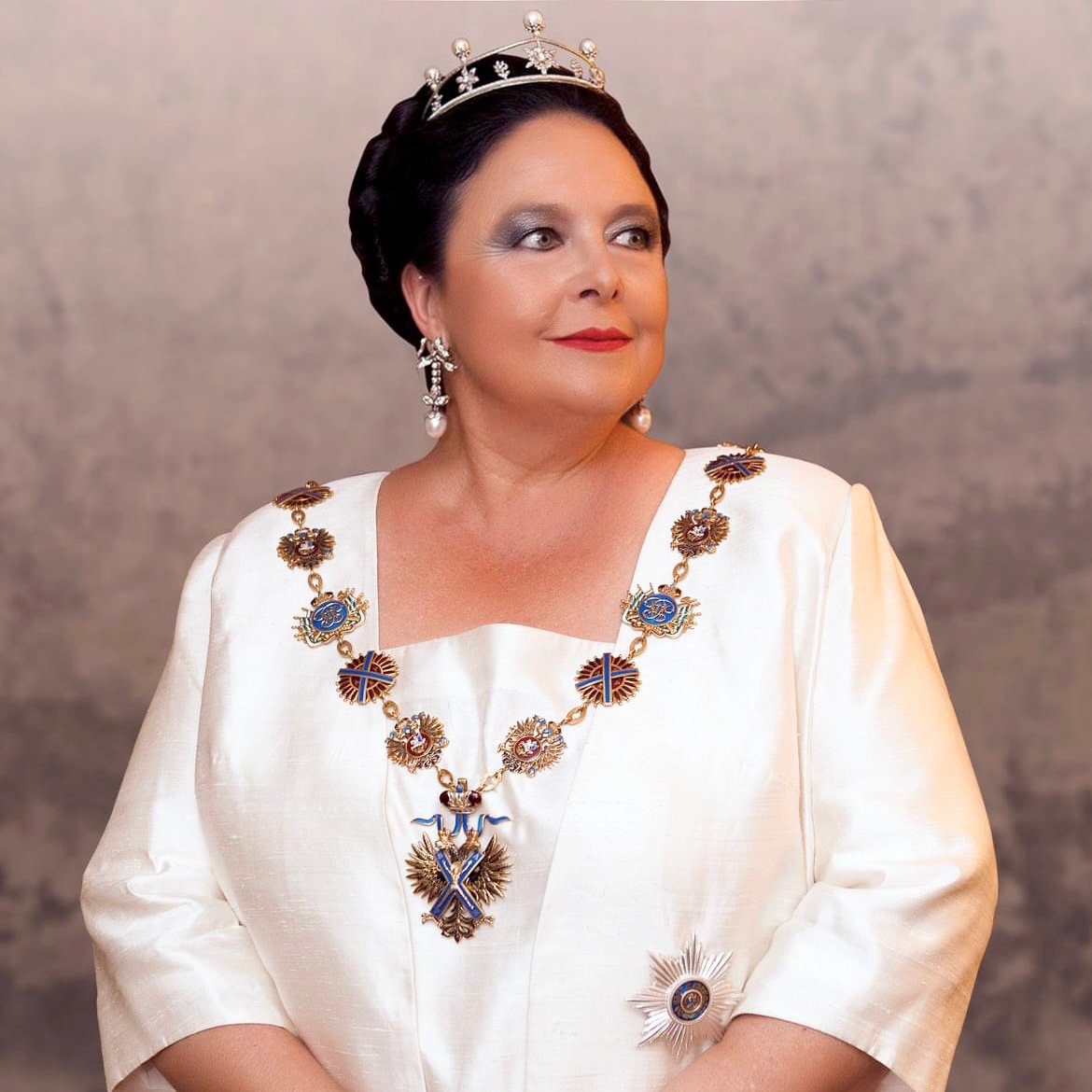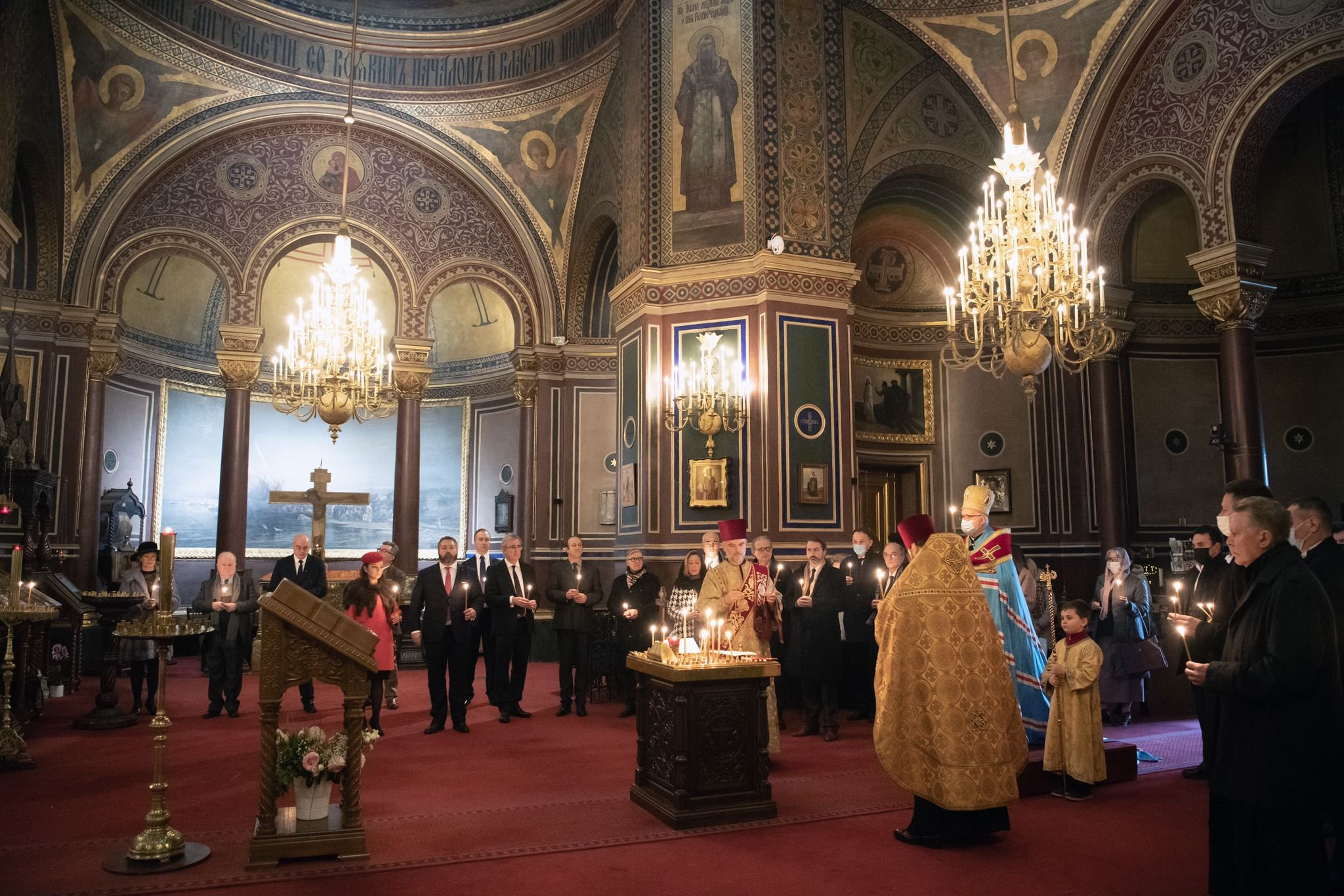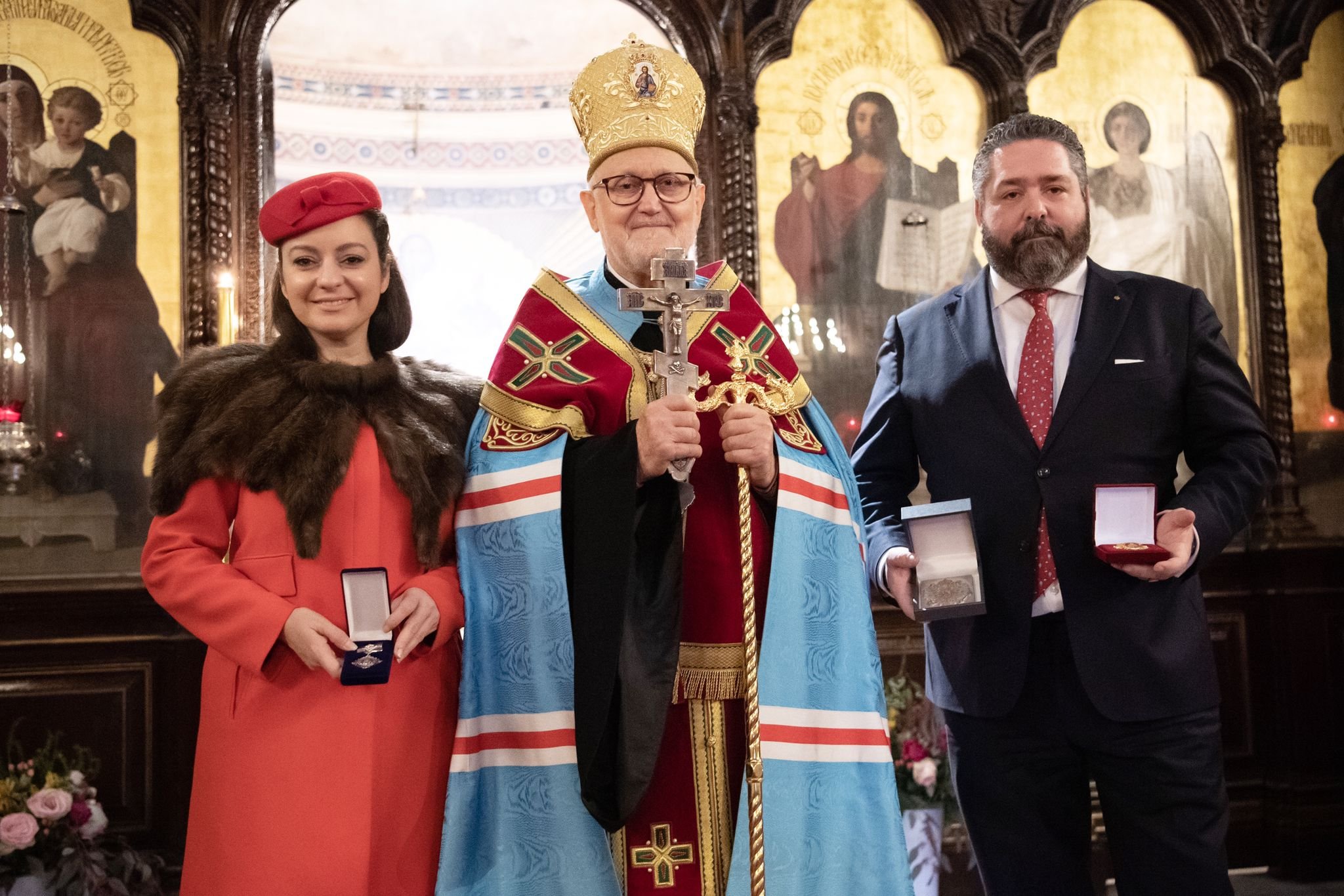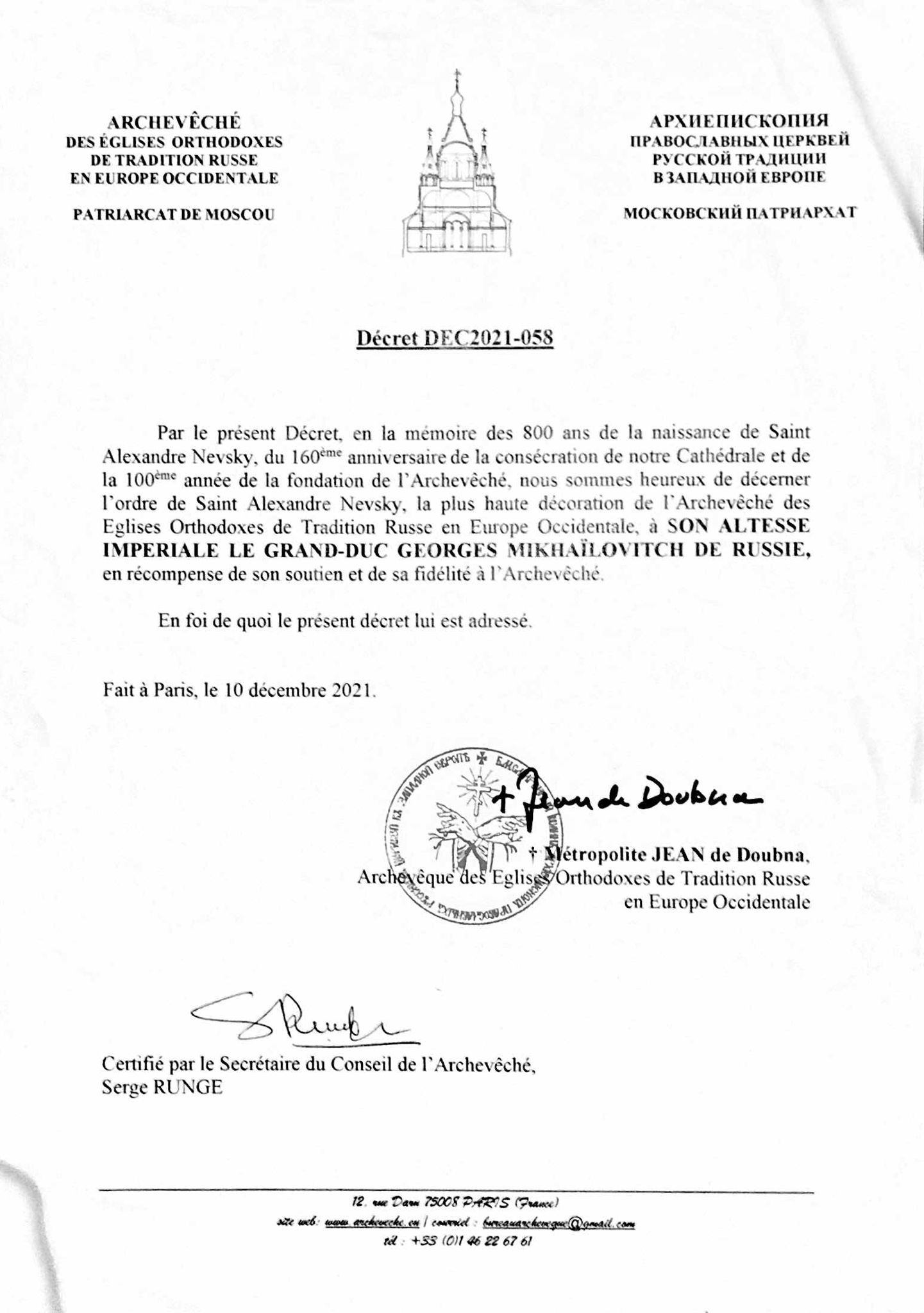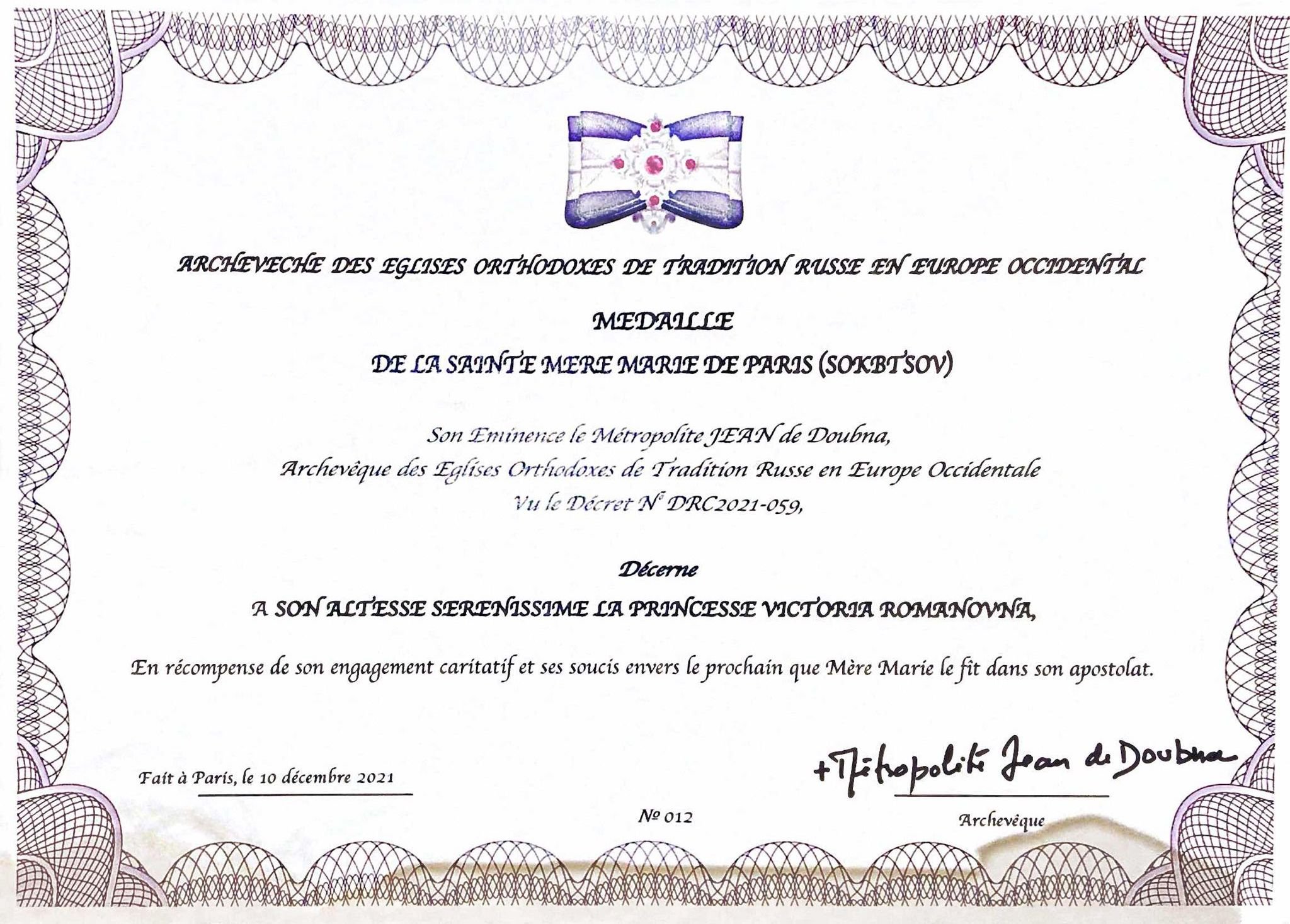The full text of the recent Spanish and Russian language interview of the Grand Duchess Maria. Vladimirovna has now been made available online thanks to a translation from the Russian Imperial Chancellery.
The English Translation is reproduced here in full:
2021-12-22 An interview of Her Imperial Highness The Grand Duchess Maria of Russia with Alberto García Palomo of the Sputnik News Agency in Madrid, Spain
Let me begin by asking how you and your family are doing?
This year we had a very happy event in our family. My son and heir, Grand Duke George of Russia, got married. His wife, Her Serene Princess Victoria Romanovna, is a tower of strength for him. Their wedding took place in St. Petersburg in a very grand and solemn manner. Many of our relatives from many of the dynasties of Europe attended it. Some were unable to come because of travel restrictions put in place on account of the pandemic, but they nonetheless sent their warmest congratulations to the couple. I am glad that George and Victoria are now permanently living in Russia, which is very important for the ongoing process of reintegrating the Imperial House into the social life of our country.
How did the early part of the pandemic go for you and how have these last few months been?
I contracted COVID some time ago in a relatively mild form, thank God. My son and his then fiancée were vaccinated in Moscow with the Russian vaccine. I also got vaccinated as soon as it was medically safe to do so after my illness. At the same time, I am very deeply saddened that so many of my countrymen have suffered and died from this new and still poorly understood disease. In the past two years, 2020 and 2021, we have lost so many dear and faithful friends. My heart breaks both for friends and strangers alike. I implore everyone to act responsibly, not to fall into panic or despair, and not to take this pandemic lightly, but to take precautions to protect their own health and the health of those around them.
You appear often in the public and attract enormous attention when you do. How do you feel about all the media attention?
I do not participate in politics nor am I some kind of showman seeking to attract media attention to myself. If there is some public interest in me and my work, I attribute that to a healthy sense of respect for Russia’s historical and cultural heritage and to the traditional worldview of many who take an interest in the Imperial House. I am open to dialogue, and I never shy away from answering anyone’s questions, including difficult and critical ones. I am always ready to engage and work with anyone and everyone. But I also never seek to impose myself or my views on anyone.
Which do you prefer to discuss, the history of your family or currently trendy topics? Let’s talk about your last name.
I do not have any “favourite” historical topics or periods. Everything in history is interesting and important to me. What topics happen to be trending today will change tomorrow, but all history in every period is useful. Even the sad pages of our past serve as a lesson for us. Thus I tend to agree when people say that, in principle, History is a continuous and ongoing thing—that without knowing the past we can never properly create the present or the future.
What significance does the word “dynasty” have for you?
The word Dynasty signifies continuity. Not just the continuity of a family, but the continuity of spiritual, moral, legal, social, and cultural values and principles. Preserving the continuity of those values and principles is, I believe, the main mission of the Russian Imperial House of Romanoff.
How would you define the Romanoffs and the period of their rule, from the 17th to the early 20th centuries?
A period of more than 300 years cannot be characterized by any single definition. There were ups and downs, victories and defeats, glorious achievements and victories and grave sins and mistakes. But I can say the following with certainty: my ancestors loved their country and their people and their service was for the benefit of both. Emperor Nicholas II, when he was being held under arrest and was soon to be executed along with his entire family, conveyed through his daughter to his sister Grand Duchess Olga a command that no one should seek to take revenge on his behalf, because even if evil should continue to grow, “evil will not triumph over evil, only love will.” These words could be considered our family motto in the past, now, and forever.
You once said that there was blame on both sides for the Russian Revolution and the fall of the monarchy. Is that what you still think?
The positions of the Imperial House of Russia on a variety of issues are arrived at very carefully and thoughtfully, and do not change with the wind. My grandfather the Emperor-in-Exile Kirill Vladimirovich, my father Grand Duke Vladimir Kirillovich, and I were and remain convinced that the Revolution and Civil War were a shared misfortune with shared responsibility. Responsibility for it is borne not only by the revolutionaries, nor even by the most radical of them—the Bolsheviks—and not only by our foreign enemies who supported the revolutionary movement inside Russia, but also by the dynasty, the aristocracy, a significant part of the clergy, and the middle class.
We have no right to act as judges and demand apologies or repentance. We ourselves apologize and repent; we ourselves ask forgiveness for the mistakes that made the Revolution possible, and we call on all to cease blaming each other, but to look for ways to build a dialogue and national harmony.
And do you think that there is now a better climate of harmony in Russia?
On the one hand, our country managed to avoid a full-scale civil war in the 1990s. The people understand this and value the current political stability. On the other hand, however, there are certain forces that seek to disrupt this stability and sow the seeds of hatred and revenge again.
The Imperial House categorically condemns any revanchism, whether it be “Red” or “White.”
Those who fought and killed during the Civil War, on both sides, have already passed away. We can only pray that the Lord will forgive them their sins and grant rest to their souls. We must not revive the confrontation between “Reds” and “Whites," but instead learn the lessons of the past and do everything in our power now to prevent that kind of political unrest and fratricide from ever happening again.
How has the Romanoff family lived through the disruptions of the past century, and the scattering of its descendants that they caused?
Of course, exile from our homeland became a terrible tragedy for us. Members of the Imperial House and their descendants were scattered across the globe. For some, Russia continued and continues to be their homeland, if only in their dreams. Others have completely assimilated into their new home countries. In each case, it depended on one’s individual circumstances and personal beliefs, to which, of course, we are all entitled.
There have been some among the Romanoff descendants who have opposed your rights of succession to the throne, such as Nicholas Romanovich. What do you think of their position?
Each family, and even more so a dynasty, has its own “Frondeurs.” This was the case even in time of absolutist monarchies, when rulers had unlimited power. And when the dynasty has been deprived of its throne and power and is in exile, it becomes only a fertile breeding ground for this kind of inner opposition. There will always be relatives who are unhappy about something, who make various claims, are quick to be jealous, or get offended.
I treat all my relatives with affection, and I am ready to work with any and all of them, regardless of how closely related we are or their dynastic status. If one of them does not like me, I still pray for him and wish him well.
Sometimes our critics simply do not understand that the position of Head of the Imperial House is, first and foremost, not about rights, but duties. These duties are inherited in accordance with the law, and not on the basis of who likes and dislikes whom, what political groups recognize or do not recognize you, and so on.
The law is the basic cornerstone of the historically established principle of legitimate monarchy. If we take this principle seriously, as we and our faithful supporters do, then it must be followed. And if we do not recognize this principle and reject it, then it would be pointless to insist on anything or to dispute anything in this regard.
A royal dynasty that rejects the idea of monarchy and the rules of lawful succession is as absurd and impossible to imagine as the Church renouncing faith in God and abolishing the canons.
Of course, there are always a certain percentage of anti-monarchists and atheists in society. But you also need to engage in dialogue with them too, always remaining respectful and friendly. But such ones really cannot be inside historical institutions, like a dynasty.
It is impossible to consider yourself a member of a royal family and yet deny the fundamental dynastic laws and traditions of that family, just as it is impossible to consider oneself a member of the Church and at the same time not believe in God or reject doctrines and canons.
And what of the Church that considers you to be the Empress, the Orthodox Church?
The Russian Orthodox Church has from the very beginning supported the return of our House to Russia. The day after my parents arrived for the first time in their homeland they met with Patriarch Aleksei II and Metropolitan Kirill, who is now our Patriarch. Since then, the Church has shown us unceasing love and respect, and has understood our mission. And we always support the Russian Orthodox Church with all our strength and energy. We also have good relations with the spiritual leaders of other traditional religions in Russia—Muslims, Jews, Buddhists—which is a longstanding custom for our dynasty.
Regarding the legal questions—should there ever be a restoration of the monarchy, your son George would not have a right to the throne according to the Salic Law. What is your feeling about that?
The Salic Law has never been the custom in Russia. The Law of Succession issued by Emperor Paul I in 1797 established male primogeniture with the transition of the succession to the female line in the event of the extinction of all male dynastic offspring. The larger part of the Law of Paul I is actually devoted to specifying how the succession to the throne passes through the female line of descent. Moreover, the Law especially notes that when the succession reaches a woman, she is not merely a person through whom the succession is transferred to some other male dynast, but she herself becomes the legal Head of the Dynasty.
This actually happened in 1992 when my father died. There were then other descendants in the direct male line, but they are descended from members of the dynasty who entered into non-dynastic marriages. Therefore, according to the Law, I became the Head of the Russian Imperial House. My son, in due course, will become the Head of the Dynasty after me and will remain so until his death. If the Lord grants him children, the status of this offspring will likewise be determined in due course. Theoretically, the idea of adjusting some of the laws of our dynasty in the future is not outside the realm of possibility. But as long as the current Law is in effect, it cannot be violated. This is the essence of legitimism. Not that the law can never in principle be changed, but that the laws in force, whatever they be, must be observed.
How do you prefer to be called, Maria I of Russia or Grand Duchess?
It matters most to me that people understand the ideals and principles that guide me. And they have respected these ideals and principles, even if some do not share them or do not agree with me on everything. I likewise try to respect those who honestly and sincerely follow their own ideals and principles, even if I do not agree with them ideologically. As for titles and forms of address, that is all of secondary importance to me. There is a certain etiquette that we observe of course, if only out of courtesy. My historical title is Imperial Highness. But if someone calls me “Maria Vladimirovna” or “Maria Romanova,” I am not in the slightest offended.
What is the daily routine of a member of the Russian Imperial House from waking up in the morning to going to bed at night?
In a monarchy, the daily life of the Heads and members of dynasties is strictly regulated. Our not being in power certainly has its advantages. I can have a lifestyle typical of most people: spending time reading, gardening, taking walks, traveling, shopping. Of course, I devote a very large amount of time to social work—charities, meeting with and corresponding with my countrymen on a variety of social and cultural issues, and so on. But my life is not run through with court etiquette, protocol, or stringent security measures. These elements are, certainly, “included” when I visit Russia or the other states that arose on the territory of the former Russian Empire. But I always ask the organizers of these visits—and I make an effort as best I can myself—to have as little of this as possible, to have the arrangements for me be as simplified as possible, so I can have the opportunity to see how my fellow countrymen really live, to meet and speak with them freely and openly.
What relationships do you have with other royal families that do not hold power in their countries, such as the royal families of France or Germany?
We are related in one way or another with all European dynasties. We are, in fact, all one big family. We enjoy very good relations with the Royal House of France, and we are closely related to the Imperial House of Germany and other German royal houses.
And what about with other Romanoffs, such as the actress Nicoletta Romanoff?
As I have already said, I am always very glad to meet my relatives. When we are together at some event in Russia, I always greet them and ask the organizers to be attentive to them and look after their needs (since, unfortunately, most of them do not speak or understand Russian).
I actually do not know Mrs. Nicoletta Consolo. The fact that she uses Romanoff as her stage name is her choice, of which I neither approve nor disapprove. From the point of view of modern laws, she probably has a right to it, inasmuch as her grandfather on her mother's side bore the name Romanoff.
But the tradition among the Romanoffs was actually the opposite: when one of them was engaged in some form of creative arts, he did not try to call attention to himself by using the “royal surname,” but, on the contrary, hid behind a pseudonym so that people would appreciate his art not because of his name, but because of the merits of his work. Such was the case, for example, of the Grand Duke Konstantin Konstantinovich, who wrote wonderful poems set to music by P.I. Tchaikovsky and other great Russian composers, all under the pseudonym “K.R.” Even the Great Reformer of Russia, Peter I the Great, called himself “Peter Mikhailov” when he traveled privately, so that those around him saw not a tsar, not a descendant of a powerful dynasty, but a soldier, a craftsman, a doctor, and so on. I think that these are good examples to follow.
I’m curious what did you feel when you returned to Russia in the 90s? How often do you visit Russia now and how do you see things there?
When I came to Russia for the first time, I experienced a mixture of feelings—both joy and pain. My first visit was when my father died. I accompanied his coffin. My countrymen embraced me with love, care, and sympathy and helped me to get through my grief and gather my courage to accept the responsibility entrusted to me to be his heir. My country was at that time going through a crisis and there was much uncertainty. The Communist regime, which had existed for more than 70 years, has just collapsed. Several generations had grown up under its rule. It was clear to everyone then that this ideology and system had outlived itself, that changes were necessary. But what these changes would be, what they would lead to—few knew. It was an era of great hopes and terrible disappointments. Unfortunately, many promises made by the new leaders turned out to be misguided or false, and many of the hopes and aspirations of the people were not realized due to the cynical deceit or ill-considered reforms of some of those in power. It sometimes seemed to me from the look of things that Russia had just experienced some kind of war that nobody had known about. This impression was created by the sad and overwrought faces I saw, the gray streets, abandoned fields, idle factories, and crumbling and uncomfortable buildings.
Over the past 30 years, I have traveled across almost all of Russia, visiting most of its regions from Kaliningrad to Kamchatka, from Arkhangelsk and Murmansk in the north to Ingushetia and Kalmykia in the south, and Buryatia. I also visited several newly independent states—Ukraine, Belarus, Georgia, Armenia, Uzbekistan, and Transnistria.
Everywhere I have gone, I have seen kindness, optimism and joy, but, unfortunately, also much suffering and grief.
But I can say one thing about Russia: that since the first years of the 21st century, the general atmosphere there has improved a great deal. More smiles have appeared on the people's faces. The situation inside the country has become much more stable. I know that there are still many difficult problems in both domestic and foreign policy. But those who try to paint a picture of Russia as the “Evil Empire” are being profoundly unjust to our country. This image of Russia in no way corresponds with reality.
We are not without sin, certainly, but then we are often judged by those who commit the very same or even worse sins. I urge observers to treat my county objectively, neither idealizing nor demonizing it, and abandoning all double standards, as when Russia is hotly condemned for things other countries themselves do without the slightest embarrassment.
Finally, you were born in Madrid and educated in France and England. What stands out about each country you’ve lived in and how has each country affected your personality?
We are very grateful to Spain and France, which gave us shelter during the years of exile, when we could not even dream of returning to our homeland. I have wonderful memories of my student years in England. Queen Elizabeth II is my third cousin. The Duke of Kent and Prince Michael of Kent are my second cousins. We also have very close kinship ties with the Spanish Royal House through Queen Sofia, who is our dear friend. The French Republic has always been very friendly to us. All these countries are part of our history and of our soul. Knowing their great cultures has enriched our inner world. One of the main directions of my activities is to work in partnership to strengthening the humanitarian ties between Russia and other European countries, with which we have so much in common in a civilizational and cultural sense. In today’s world, the Imperial House is not interested in politics. But we are trying to the best of our ability to exert “soft power,” to be a kind of shock absorber in situations of conflict, which, in the final analysis, do not benefit the people. I hope that we can contribute to the effort to ensure that not all bridges are burned and not all connections are severed between and among the nations of the world.
***
https://mundo.sputniknews.com/20211215/heredera-de-los-zares-rusos-los-bolcheviques-no-son-los-unicos-responsables-de-la-guerra-civil-1119350630.html
